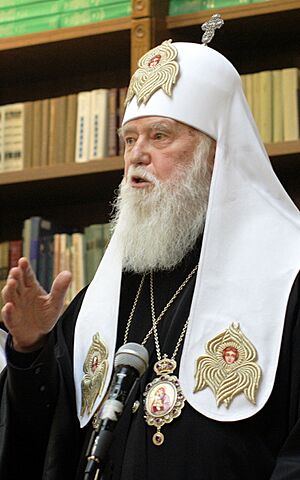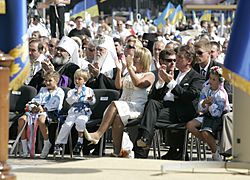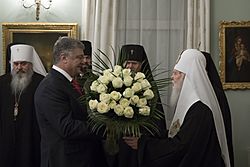Filaret Denysenko facts for kids
Quick facts for kids His Holiness and Beatitude Filaret |
|
|---|---|
| Archbishop and Metropolitan of Kyiv – Mother of the Rus Cities and of Galicia, Patriarch of All Rus-Ukraine, Holy Archimandrite of the Holy Assumption Kyiv-Pechersk and Pochaev Lavras | |

Filaret in 2013
|
|
| Church | Kyiv Patriarchate |
| See | Patriarch of Kyiv and all Ukraine |
| Enthroned | July 1995 |
| Reign ended | 15 December 2018 |
| Predecessor | Ioasaph II (Ukrainian Orthodox Church (Moscow Patriarchate)) Volodymyr (Ukrainian Orthodox Church – Kyiv Patriarchate) |
| Successor | Metropolitan Epiphany I (Orthodox Church of Ukraine) himself as "Honorary Patriarch" |
| Orders | |
| Ordination | 18 June 1951 |
| Consecration | 4 February 1962 by Pimen I of Moscow |
| Personal details | |
| Birth name | Mykhailo Antonovych Denysenko |
| Born | 23 January 1929 Blahodatne, Amvrosiivka Raion, Donetsk, Ukrainian SSR |
| Signature |  |
Patriarch Filaret (born Mykhailo Antonovych Denysenko on January 23, 1929) is a Ukrainian religious leader. He currently serves as the head of the Ukrainian Orthodox Church – Kyiv Patriarchate. The Orthodox Church of Ukraine, which he left in 2019, sees him as an "Honorary Patriarch." The Ecumenical Patriarchate of Constantinople recognizes him as a former Metropolitan of Kyiv.
Before joining the Kyiv Patriarchate, he was the Metropolitan of Kyiv and the Exarch of Ukraine in the Moscow Patriarchate from 1966 to 1992. After he joined the Kyiv Patriarchate, the Russian Orthodox Church removed him from his church duties and later officially separated from him. However, on October 11, 2018, the Patriarchate of Constantinople welcomed him back into church community. They saw him as a bishop again, but not as a Patriarch. On December 15, 2018, the Ukrainian Orthodox Church of the Kyiv Patriarchate joined with other churches to form the Orthodox Church of Ukraine. This meant the Kyiv Patriarchate stopped existing as a separate church.
Contents
- Early Life and Education
- Serving the Russian Orthodox Church
- Forming the Ukrainian Orthodox Church – Kyiv Patriarchate
- Suspension and Separation
- Leading the Ukrainian Orthodox Church – Kyiv Patriarchate
- Role in the Orthodox Church of Ukraine
- Political Views
- Awards and Recognition
- Images for kids
- See Also
Early Life and Education
Mykhailo Denysenko was born on January 23, 1929. His family lived in the village of Blahodatne in eastern Ukraine. He studied to become a priest at the Odesa Seminary and the Moscow Theological Academy. There, he worked closely with Patriarch Alexius I of Moscow.
In 1950, he took monastic vows, which means he promised to live a religious life. He chose the monastic name Filaret. He became a hierodeacon (a deacon who is also a monk) in January 1950 and a priest in June 1951. After finishing his studies, he taught at the Moscow Theological Academy. In 1956, he became an inspector at the Theological Seminary in Saratov and was promoted to the rank of hegumen (the head of a monastery). In 1957, he became an inspector at the Kyiv Theological Seminary. In 1958, he was promoted again to Archimandrite (a high-ranking monk) and became the rector (head) of the seminary.
Serving the Russian Orthodox Church
In 1961, Filaret worked for the Russian Orthodox Church (ROC) in Egypt. In January 1962, he was chosen to be a vicar Bishop for the Leningrad area. A month later, he was ordained as a bishop in Leningrad. He also served on several diplomatic missions for the Russian Orthodox Church. From 1962 to 1964, he was the ROC Bishop of Vienna and Austria. In 1964, he returned to Moscow as the Bishop of Dmitrov and the rector of the Moscow Theological Academy.
In 1966, he became the archbishop of Kyiv and Halych. This made him one of the most important leaders in the Russian Orthodox Church. The position of Kyiv Metropolitan was highly respected. He also became a permanent member of the Holy Synod, which is the highest group in the Russian Orthodox Church. This group is responsible for choosing the Moscow Patriarch. In 1968, Filaret became the Metropolitan of Kyiv and Galicia.
During the Soviet era, church leaders often had to have contact with the KGB, the state security agency. Filaret himself stated that he, like other bishops under communism, had to have these contacts. He mentioned that every bishop of the Moscow Patriarchate had to interact with the KGB, even when appointing new bishops.
On May 3, 1990, Patriarch Pimen of Moscow died. Filaret temporarily took over as the head of the Russian Orthodox Church. However, he was not chosen to be the next Patriarch of Moscow. He later said that this was not by chance, and that God was preparing him for Ukraine.
On October 27, 1990, Patriarch Alexei II gave Metropolitan Filaret a special document called a tomos. This document gave the Ukrainian Orthodox Church "independence in self-government." Filaret, who was already the "Metropolitan of Kyiv," was then named "Metropolitan of Kyiv and All-Ukraine."
Forming the Ukrainian Orthodox Church – Kyiv Patriarchate
After Ukraine declared its independence from the Soviet Union on August 24, 1991, the Ukrainian Orthodox Church held a big meeting called a sobor. This meeting took place from November 1 to 3. At this meeting, all the bishops, clergy, and other church members voted. They all agreed that the Ukrainian Orthodox Church should become an autocephalous church. This means it would be fully independent and govern itself. They also all agreed that Metropolitan Filaret should be its head.
In January 1992, Filaret called another meeting in Kyiv. At this meeting, they formally asked the Moscow Patriarchate for full independence for the Ukrainian Church.
In March and April 1992, the Russian Orthodox Church held a meeting to discuss the Ukrainian Church's request. Filaret was asked to resign from his position. He agreed to resign at the next meeting of the Ukrainian Orthodox Church. However, when he returned to Kyiv, Filaret changed his mind. On April 14, he told reporters that he had been pressured in Moscow. He said he was taking back his resignation because it would not bring peace to the Church and would go against the wishes of the believers.
Suspension and Separation
Soon after, the Russian Orthodox Church organized a different meeting in Kharkiv in May 1992. They saw Filaret's actions as creating a "schism" (a split in the church). At this meeting, they elected a different bishop, Volodymyr (Sabodan), as the Metropolitan of Kyiv. This group was recognized by Moscow as the Ukrainian Orthodox Church (Moscow Patriarchate).
Filaret was suspended from his duties by the Ukrainian Orthodox Church (Moscow Patriarchate) on May 27, 1992. Bishops who supported Filaret then joined with another Ukrainian church group. On June 25, 1992, they held a meeting and agreed to form a new church called the Ukrainian Orthodox Church - Kyiv Patriarchate (UOC-KP). They elected Patriarch Mstyslav as its head.
On July 11, 1992, the Russian Orthodox Church officially removed Filaret from his church office, a process called defrocking. The UOC-KP was not recognized by other Orthodox churches at that time. In 1997, the Russian Orthodox Church went further and officially separated from Filaret, a process called anathematization.
Leading the Ukrainian Orthodox Church – Kyiv Patriarchate

After Patriarch Mstyslav died in 1993, the UOC-KP was led by Patriarch Volodymyr. In July 1995, after Volodymyr's death, Filaret was elected as the head of the UOC-KP. He received 160 out of 165 votes.
Filaret helped to ordain many bishops during his time as head of the UOC-KP.

On October 11, 2018, the Holy Synod of the Ecumenical Patriarchate of Constantinople announced that Filaret Denisenko was "restored to communion with the Church." This meant he was welcomed back into the wider Orthodox community. The Ecumenical Patriarchate also said that the Moscow Patriarchate no longer had authority over the Kyiv region. This meant all the bishops there were now under the Ecumenical Patriarchate's authority.
On October 20, 2018, the UOC-KP changed the official title of its head. The full title became very long, but a shorter version was "His Holiness (name), Patriarch of Kyiv and All Rus'-Ukraine." The Russian Orthodox Church called this new title a "farce" and continued to see Filaret as someone who had caused a church split.
Role in the Orthodox Church of Ukraine
On December 15, 2018, the leaders of the UAOC and the UOC-KP decided to dissolve their churches. This was because they were joining with some members of the Ukrainian Orthodox Church (Moscow Patriarchate) to form the Orthodox Church of Ukraine (OCU). Filaret was given the title of "honorary patriarch" of the OCU. This title was a way to respect his past leadership, but it wasn't clearly defined in the OCU's rules.
On January 16, 2019, Filaret asked to be remembered in church services before Epiphanius, who was the new head of the OCU. He signed this request as "Filaret, Patriarch of Kyiv and All Rus'-Ukraine." On January 20, 2019, Filaret said in an interview that he was still a patriarch for Ukraine, even if other Orthodox churches didn't recognize him as such.
On February 5, 2019, the Holy Synod of the OCU appointed Filaret as the bishop for the city of Kyiv, except for one specific monastery.
In March 2019, Epiphanius explained that Filaret had built the Kyiv Patriarchate for over 25 years. He said that Filaret had agreed to step aside for the new united church. Epiphanius stated that Filaret would remain a bishop for Kyiv and continue to work for the Ukrainian Orthodox Church, but he would not manage the entire church.
Disagreements
Later, some disagreements arose between Filaret and Epiphanius. These disagreements were about how the OCU should be governed, how it should manage its churches outside Ukraine, and its official name and rules.
Filaret believed there was an agreement that the new head of the OCU would handle external church matters, while the patriarch (Filaret) would handle internal church life in Ukraine, working with the new head. He felt this agreement was not being followed.
Political Views
In March 2014, Filaret spoke out against Russia's actions in Crimea.
On September 5, 2014, during the conflict in eastern Ukraine, Filaret held a service to honor those who died during the Euromaidan protests. He spoke about the conflict, saying that a "new Cain" had appeared among world leaders, referring to someone who calls himself a brother but sheds blood and spreads lies.
Filaret also stated that the local people in Donbas "must pay for their guilt [in rejecting Kyiv's authority] through suffering and blood."
Awards and Recognition
Filaret has received several awards for his work and service.
Ukrainian State Awards
- Order "For intellectual courage" (2018)
- Order of Prince Yaroslav the Wise (various classes, 1999-2008)
- Cross of Ivan Mazepa (2011)
- Hero of Ukraine (2019)
USSR Awards
- Order of Friendship of Peoples (1980)
- Order of the Red Banner of Labour (1988)
Images for kids
See Also
- History of Christianity in Ukraine
- List of metropolitans and patriarchs of Kyiv
- Conflict between Filaret and Epiphanius
 | DeHart Hubbard |
 | Wilma Rudolph |
 | Jesse Owens |
 | Jackie Joyner-Kersee |
 | Major Taylor |




